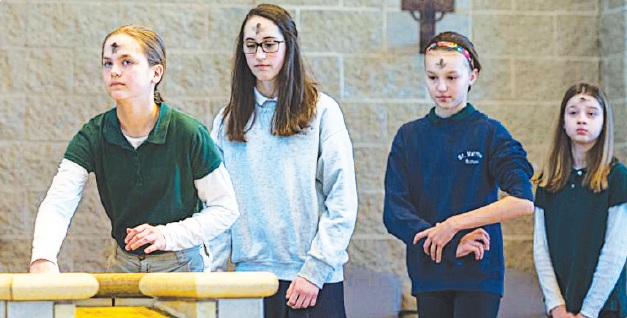Biblical origins of Mass
The celebration of the Eucharist is “the source and summit of the Christian life,” reads the Catechism of the Catholic Church (No. 1324). Yet, even for many faithful Catholics and for those who observe a Catholic Mass for the first time, the celebration can appear mysterious, if not altogether confusing.
Sep 15, 2017

By Allan F. Wright
The celebration of the Eucharist is “the source and summit of the Christian life,” reads the Catechism of the Catholic Church (No. 1324). Yet, even for many faithful Catholics and for those who observe a Catholic Mass for the first time, the celebration can appear mysterious, if not altogether confusing.
It’s as if each time you attend Mass you receive two or three puzzle pieces that are beautiful but you never have the whole picture in front of you so that you can see where they fit, especially from a biblical perspective.
The Mass has some obvious connections to sacred Scripture such as a selection of readings from the Old and New Testaments, the singing of the Psalms and hearing the words of Jesus at the consecration of the bread and wine.
However, from the moment we walk into church and bless ourselves with holy water, we are connected with the apostles who were sent on a mission and sealed the newly baptised by marking their foreheads with the sign of the cross (Ez 9:4, Eph 1:3, Rv 7:3).
Jesus commanded his disciples to baptise, “in the name of the Father, the Son and the Holy Spirit” in Mt 28:16-20. For those who are baptised, this action of dipping our fingers in the holy water and blessing ourselves reminds us that we are redeemed and that we belong to Christ.
As the Mass proceeds, we can detect a pattern through the dialogue between the faithful and God that is mediated through the priest. Our prayer ascends to God and then his word descends to us. Our gifts of bread and wine are presented and “offered up” to the Father and the Father presents us with his best gift, Jesus, fully present, body, blood, soul and divinity in the Eucharist.
In this dialogue, we hear words that are taken directly from Scripture: “The Lord be with your spirit” (2 Tm 4:22); “Lord, have mercy” (Ps 30:11); “Holy, Holy, Holy” (Is 6:3); the Our Father prayer (Mt 6:9-13); “Lord, ... I am not worthy to have you enter under my roof” (Lk 7:6); “Behold, the Lamb of God” (Jn 1:29); and “This is my body” (Lk 22:19).
In addition to the words we hear and speak during the Mass, our actions are not arbitrary but come directly from Scripture. Kneeling (Acts 21:5, Ps 95:6), singing (Acts 16:25), offering a sign of peace (1 Thes 5:26), offering bread and wine (Gn 14:18, Mt 26:26-28), gathering around an altar (Gn 12:7, Rv 16:7), and the use of incense (Rv 8:4) are all actions that come to us from the Bible.
The puzzle pieces, the readings, actions and words at Mass, do indeed reveal a bigger picture: the picture of a God who loves us and died for us so that we may come alive in this life and have eternal life. The words and actions of the faithful and the priest are rooted in our “family history” which comes to us in sacred Scripture. --CNS







Total Comments:0